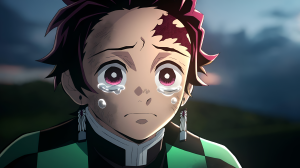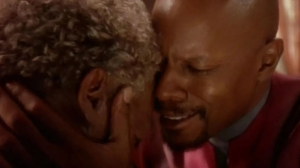Today’s issue of Action Comics depicts Superman protecting a group of immigrants from a hate crime, and has drawn praise and criticism from pundits and fans as a result.
Videos by ComicBook.com
In Action Comics #987, Superman is moving at a frantic pace, forced to deal with numerous crimes that bring the worst of humanity to the foreground. The Man of Steel encounters everyday (read: non-supervillain) people who doing things driven by greed, fear, and pettiness. The gunman mentioned above and a man trying to hijack a truck full of pharmaceuticals meant to contain a smallpox outbreak are just the beginning.
The gunman is an angry, unemployed American who opens fire on a group of immigrants because “they stole from me — ruined me!”
Over at The Hollywood Reporter, comics columnist Graeme McMillan discussed the scene — and Superman’s borders-free brand of humanitarianism — in the cultural context of an increasingly isolationist America, led by a President who made rounding up and deporting illegal immigrants his signature campaign promise.
McMillan interprets the scene as suggesting that the immigrants are in the country illegally, which is likely the case although in dialogue all it says is that they are not citizens. Superman disarms the gunman and then turns him over to the police, asking that the officers make sure the immigrants are safe and taken care of. If they are undocumented, then, either Superman does not know it or he just handed them over to the authorities. Since the art does not indicate fear of the authorities on the part of the migrant workers, one could read that as them being legal workers.
All of that is probably overthinking the issue, but a quick point of order: According to the United States Bureau of Labor Statistics, a little over 15% of the U.S. workforce is made up of non-citizen migrant workers — a classification that includes both legal and illegal immigrants as well as certain students and others.
Studies that attempt to break the numbers down further are often politicized and frankly tangential to the discussion of Action Comics #987.
The conversation on Twitter, where a “moment” related to Action Comics #987 centered not on the much-ballyhooed reveal of Mr. Oz’s identity but on the scene in which Superman saves the immigrants, saw users arguing back and forth, with some upset that Superman was depicted as “siding” with undocumented immigrants and others celebrating the portrayal as empathetic.
“The darkness in people bubbling to the surface is sadly very relevant,” tweeted one fan. “This feels like Superman vs. 2017.”
Ryan Teague Beckwith, one of Time‘s politics editors, tweeted that “As an undocumented immigrant who came to the U.S. as a child, Superman is technically a Dreamer,” drawing a broad range of cheers and jeers.
To fans familiar with the work of writer Dan Jurgens, his handling of the issue did not feel particularly out of the ordinary. Jurgens was one of the key architects of Superman comics in the 1990s, when writers like John Byrne, Marv Wolfman, Karl Kesel, Jerry Ordway, Louise Simonson, and Jurgens himself tackled social ills with some reguarity.
Jurgens himself rarely wades into particularly controversial political waters on social media, and his work is best described as centrist, with characters focusing more on issues of conscience than controversy. Military and veterans’ issues are a recurring theme in his work, and Jurgens has written and drawn numerous stories and series that are either for or about the military.
A memorable story in 1999 saw a veteran who was left paralyzed following one of Superman’s battles burning the Man of Steel’s cape in effigy on the cover, an apparent reference to the anti-war soldier’s story Born on the Fourth of July.
Other topical themes that have found their way into Jurgens’s Superman work (let’s not even get into his Captain America work, or we will be here all day) include a story about domestic violence (co-written with Louise Simonson, who at the time penned Superman: The Man of Steel), numerous tales documenting how Superman deals with the pressures of everyday people believing he can (and should) do the impossible, and a story about teen binge drinking.
In a memorable 1994 story, Superman struggled with the realization that a personal friend of his hoped to murder her son’s killer during a jail visit — something that arguably shares some DNA with the immigrant scene in Action Comics #987, as Cat Grant was moved to violence not by evil but by pain and desperation.
Before and after Jurgens and the rest of the post-Crisis crew mentioned above, Superman has a long history of sticking up for the perceived little guy, busting slumlords and abusive husbands in his early appearances in the Golden Age and single-handedly defeating Hitler in a famous two-page “what if…” story from Look Magazine. Elements of this more “social justice”-friendly Superman was incorporated into Grant Morrison’s 2011 Action Comics run, and later in to the 2015 story by Greg Pak and Gene Luen Yang; both of those proved divisive with modern comic book audiences.
For years, the Man of Steel would be featured in socially-conscious or somewhat political stories, but in general there would be little controversy, since Superman had a general sense of humanitarian, almost Christ-like benevolence toward all people — an ethic that was difficult to attack.
An increasingly-polarized political culture in the U.S. seems to be rendering some of those previously-innocuous super-feats more controversial, as evidenced with today’s dust-up, but in many cases critics may be missing the forest for the trees: while protecting immigrants may be perceived as a Democratic goal, Superman also stood up for police (typically a favorite with Republicans) after a number of bystanders shouted a cop down for doing his job.
Narratively, this discussion ignores the larger issue at play: the sad, broken man who was about to commit a hate crime suddenly became violent just as Mister Oz put some kind of plan into play. An oil spill was caused by a tanker captain getting drunk on the job; guerillas attacked a medical tent where vaccines were being distributed; poachers butchered a protected rhino for its horn; two men gloated over sweatshop profits.
All of these people — and, yes, the worker who took up arms against immigrants after being laid off — were adorned with a brand or tattoo placed on them by Mr. Oz, the villain of the storyline. Mr. Oz’s position is that Superman is too good for Earth, that humanity does not deserve the Man of Steel, and in the issue he sets to prove it out by playing on humanity’s fears, their shortcomings, and their darkest impulses.
Those bystanders who were berating the cop? They believed that he had ruined the vaccines by running a medical supply truck off a bridge. The officer defended himself, saying that the high speed chase was valid since the truck had been hijacked. After Superman successfully rescued both the drugs and the waterlogged hijacker, the bystanders immediately forgave the officer, but turned their rage on the hijacker, suggesting the cop “let him die.”
That, it seems, is the “Oz Effect” advertised by the storyline’s title. Given what we know about its fallout — that Superman is despondent by the time it is done — it seems likely Mr. Oz is not entirely responsible for these actions, and that Superman will have to deal with the darkest elements of humanity.
This will of course come into play just as Doomsday Clock — a story in which Superman has to stand for hope against the cynicism of Watchmen‘s Doctor Manhattan — kicks into gear in November.
What the audience can see in Action Comics #987 is not just a Superman who lives up to the “melting pot” promise that generations of Americans have grown up with, but one who trusts in humanity enough to protect everybody and let the details sort themselves out. Mister Oz, it seems, wants to tax that trust to the breaking point, which makes this issue an ideal jumping-off point for the story Jurgens hopes to tell.








